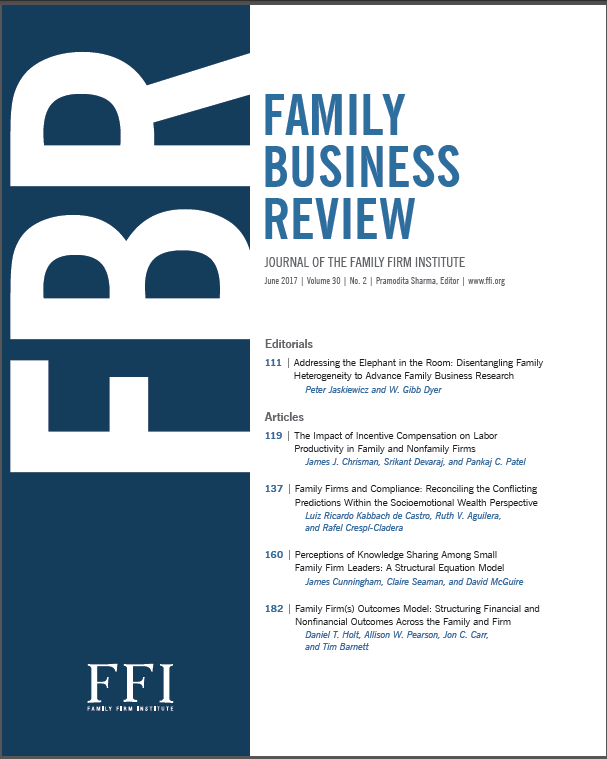社会情感财富(SEW):构念效度问题
IF 5.6
1区 管理学
Q1 BUSINESS
引用次数: 50
摘要
在过去的15年里,家族企业研究领域有了巨大的发展。这一时期最重要的发展之一是社会情感财富(SEW)的概念,该概念主要建立在Gomez-Mejia, Haynes, Nuñez-Nickel, Jacobson和Moyano-Fuentes在2007年的开创性工作之上。事实上,在Web of Science的商业、管理和经济类别中,引用SEW的文章数量已从2007年的3篇增加到2018年的147篇。截至2019年10月,Berrone、Cruz和Gomez-Mejia在《家族企业评论》(Family Business Review)上发表的这篇文章被学者引用了1200多万次,并且每年都是访问量最大的文章之一。在这个不断扩大的文献中,sew——也被称为情感禀赋——通常被称为由委托人(即家庭)从企业中获得的非经济效用。基于前景和行为代理理论,SEW被认为是家族企业管理的主要参考框架(Gomez-Mejia, Cruz, Berrone, & De Castro, 2011)。因此,在做出重大战略决策时,家族企业的动机是希望保留或加强SEW (Berrone等人,2012)。虽然SEW的基本原则已经得到了很好的确立和广泛的应用,但SEW作为一个结构的承诺——也就是说,一个用于研究的假设概念或属性(Cronbach & Meehl, 1955)——尚未实现。尽管在继续取得进展的同时,关于SEW及其如何应用于家族企业研究,已经表达了许多担忧——概念上的和经验上的(例如,Chua, Chrisman, & De Massis, 2015;凯勒曼斯、埃德尔斯顿和齐薇格,2012;Miller & Le Breton-Miller, 2014;Schulze & kellermann, 2015)。从根本上说,这些问题指向了普遍缺乏关于SEW作为一个结构的有效性的明确性,其中有效性指的是一个测量准确地表示一个概念的程度。这篇社论的目的是概述关于SEW作为一个结构的几个有问题的领域,并明确呼吁在这一重要和快速增长的研究领域进行更多的理论和实证发展。正如AC/DC所哀叹的那样,如果你想要摇滚,通往顶峰还有很长的路要走。本文章由计算机程序翻译,如有差异,请以英文原文为准。
Socioemotional Wealth (SEW): Questions on Construct Validity
Over the past decade and a half, there has been tremendous growth in the family business field of study. One of the most important developments during this time period is the concept of socioemotional wealth (SEW), which is primarily founded on the seminal work of Gomez-Mejia, Haynes, Nuñez-Nickel, Jacobson, and Moyano-Fuentes in 2007. In fact, the number of articles that reference SEW has risen from 3 in 2007 to 147 in 2018 within the Web of Science categories of Business, Management, and Economics. For Family Business Review, the 2012 article by Berrone, Cruz, and Gomez-Mejia has had over 1,200 Google Scholar citations, as of October of 2019, and continues to be one of the most accessed articles year to year. Throughout this expanding literature, SEW—also known as affective endowments—is generally referred to as the noneconomic utilities derived by principals (i.e., the family) from a business. Based on prospect and behavioral agency theories, SEW is argued to serve as the main frame of reference for the management of the family business (Gomez-Mejia, Cruz, Berrone, & De Castro, 2011). As such, family businesses are motivated by the desire to preserve or enhance SEW when making major strategic decisions (Berrone et al., 2012). While the very basic tenets of SEW are well established and widely utilized, the promise of SEW as a construct—that is, a postulated concept or attribute intended for study (Cronbach & Meehl, 1955)—has yet to be realized. For while progress continues to be made, there are numerous concerns—both conceptual and empirical—that have been expressed regarding SEW and how it has been applied in family business research (e.g., Chua, Chrisman, & De Massis, 2015; Kellermanns, Eddleston, & Zellweger, 2012; Miller & Le Breton-Miller, 2014; Schulze & Kellermanns, 2015). Fundamentally, these concerns point toward a general lack of clarity regarding the validity of SEW as a construct, where validity refers to the extent to which a measure accurately represents a concept. The purpose of this editorial is to outline several problematic areas regarding SEW as a construct and make an explicit call for more theoretical and empirical development in this important and fast-growing area of research. For as AC/DC laments, it is a long way to the top if you want to rock ‘n’ roll.
求助全文
通过发布文献求助,成功后即可免费获取论文全文。
去求助
来源期刊

Family Business Review
BUSINESS-
CiteScore
12.40
自引率
13.60%
发文量
13
期刊介绍:
Family Business Review (FBR) has been a refereed journal since 1988, serving as the premier scholarly publication dedicated to the study of family-controlled enterprises. It delves into the dynamics of these businesses, encompassing a range of sizes from small to very large. FBR concentrates not only on the entrepreneurial founding generation but also on family enterprises in subsequent generations, including some of the world's oldest companies. The journal also publishes interdisciplinary research covering families of wealth, family foundations, and offices.
 求助内容:
求助内容: 应助结果提醒方式:
应助结果提醒方式:


